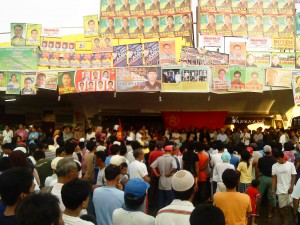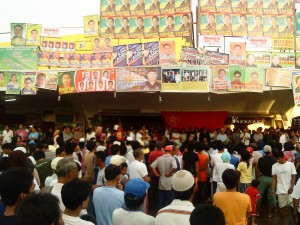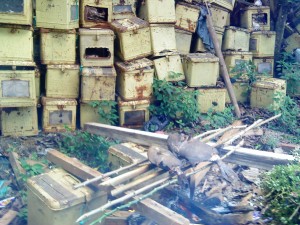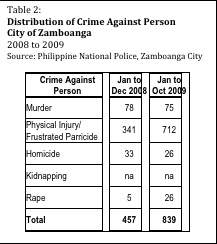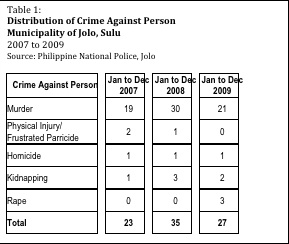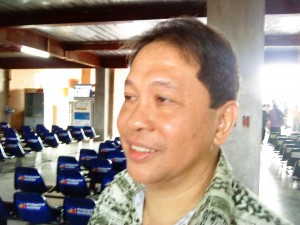By JULES L. BENITEZ
MindaNews
JOLO, Sulu.—In the evening of April 26, the barangay captain of Lahi Village in Pandami town, Hadji Isa Sitin, and his son ventured into neighboring barangay Parian Dakula to post campaign materials of the mayoral candidate they were supporting.
Seeing the two inside his domain, Parian Dakula barangay captain Kitoh Aidani, 30, opened fire at them. Father and son were not hit but instinctively retaliated. The incident resulted, in police parlance, in “1KIA and 2WIA,” or one “killed in action” and two “wounded in action.”
“Aidani was killed when Sitin and his son returned fire,” said Army Maj. Bhen Sabbaha, deputy commander of the military’s Task Force Comet 17. Sali Darul and Aidani’s son, who were not named in the report, were wounded.
The incident was listed as the latest case of election-related violence in Sulu, which has perennially been on the list of hot spots of the Commission on Elections. It prompted Task Force Comet 17 to immediately send a contingent of Marines to Pandami, a town on Lapak Island south of Jolo, to prevent the escalation of violence.
Yet people know that elections and political rivalry alone do not trigger violence in this province, a scattering of islands in the southern tip of the country sandwiched between Basilan and Tawi-tawi. Authorities and residents alike acknowledge that what makes violence prevalent here is the proliferation of loose firearms and people’s propensity to use them at the slightest provocation, election-related or not.
Records of the Sulu Integrated Provincial Health Office’s (IPHO) emergency room and in-patient records show gunshot wounds (GSW) as the leading cause of death in Sulu, second only to hypertension.
Vandrazel M. Biroma, manager of the Center for Humanitarian Dialogue that runs the Armed Violence Reduction Initiatives program, said the IPHO data did not include most deaths that resulted from the fighting among the Moro National Liberation Front, the Armed Forces of the Philippines and the Abu Sayyaf Group. Islamic practice requires corpses to be buried immediately, while the military brings its casualties to Zamboanga.
Counting these, Biroma said, GSW would definitely be the leading cause of death in Sulu.
It is difficult to say exactly how many loose firearms there are here, and authorities cite varying figures. Superintendent Elmer Escosia, provincial police director, puts the number at 1,000, while Sabbaha places it at 5,000.
But Comelec provincial election supervisor Vidzfar A. Julie has his own way of estimating: “Outside of Jolo proper, you count the number of houses and that will be equivalent to the number of loose firearms.”
Comelec’s gun ban campaign appeared to be unsuccessful in curbing the proliferation of firearms. Escosia, who has been in his post barely a month, said the police checkpoints recorded only three cases of illegal possession of firearms since the start of the election period on Jan. 10.
In addition to the problem of loose firearms, some 2,030 civilians are recognized as civilian volunteers and allowed to carry guns.
At the height of the rescue operations for the three kidnapped workers of the International Committee of the Red Cross in 2009, this civilian force was organized as Civilian Emergency Force (CEF) by the provincial government and used as force multiplier in the military operations.
In late 2009, the CEF was re-organized as the Barangay Peacekeeping Action Team–Police Auxiliary Unit and was place under the control of the Philippine National Police.
History of armed violence
There was a time before loose firearms and armed groups, way back in the 1960s, when the province was a safe place. “Sulu was peaceful and economically flourishing,” said Sali Ahalul, a middle-class businessman from Sulu’s capital Jolo. He recalled that Sulu’s economy was at the time developing faster than that of Zamboanga, currently Western Mindanao’s premier city.
Ahalul said: “During those times, Zamboanga did not yet have air-conditioned establishments while we in Jolo already had air-conditioned movie houses, restaurants and tailoring shops. Pilots, flight attendants and navigators loved to stay overnight in the town or stay in their hideaway at the pristine Quezon beach a few kilometers outside of Jolo town. We went to movie houses, would usually go home at midnight, the movie houses’ ‘goodnight’ time, and walk home to Patikul. I do not have memories of guns in those days.”
With longing, he said, “I have seen, lived and experienced the peace of Sulu.”
But things changed when Ferdinand Marcos ran for the presidency. Ahalul remembers a certain Mayor Tiger of Tapul town, who was campaigning for Marcos. He promised voters, “Kung sino man ang maka-zero sa kalaban ni Marcos sa kanyang lugar, bibigyan ko ng carbine (Whoever can give Marcos’s opponent zero vote will receive a carbine rifle).”
Ahalul, who in his younger days twice ran for public office in Jolo but never won, said election violence in Sulu started in 1969 when Marcos ran for reelection. Since then, the province of Sulu has become notorious for its capacity to deliver controlled votes for national candidates as arms started to proliferate.
“Way back, politicians kidded themselves about the elections as a contest of fooling each other, but now it is about killing each other!” Ahalul said.
Through the years, owning a gun became more important than having food to eat. “Dito, nagtitipid ang mga tao sa pagkain para makabili ng armas (Here, people scrimp on food in order to save money to buy arms),” Comelec Supervisor Julie, a native of Sulu, said.
Although gunshot wounds are the leading cause of death here, most crimes go unreported. Crime statistics of the PNP covering Jolo show a low level of index crimes such as murder, homicide, physical injury, rape, robbery, theft and car theft. For 2007, 2008 and 2009, the number of index crimes reported to the police totaled 23, 35 and 27 respectively. These figures are much lower than in Zamboanga City’s central areas where 402 crime incidents were reported in 2008.
Rising election-related violence
For this year’s elections, Pandami, Pata and Panamao towns are being closely watched by the Provincial Joint Security Control Center, chaired by the Comelec with the AFP and the PNP under its control.
On April 20, Imam Bula, a religious leader in Pata town, an island south of Jolo, was killed. The PNP confirmed the incident but has yet to come up with a detailed investigation report.
Sources from the island said Bula was caught in the crossfire between two opposing candidates for mayor, the incumbent Nurmina Burahan of Lakas-Kampi and challenger Hadji Zaldi Haddari of the Nationalist People’s Coalition.
According to the eyewitness account of an employee in the Pata municipal government who asked not to be named for security considerations, Haddari and his followers entered and occupied barangay Luuk Tulay, some six kilometers from the town center. The barangay captain then sought the assistance of the mayor who responded by shelling the barangay with mortar fire in an attempt to regain control of the area.
The deployment of Marines in the locality after a couple of days stemmed the escalation of violence.
Residents say that in the distant barangays of Sulu, when a group of armed men identified with an opposing candidate “occupies” a barangay, they are not there to campaign but to control the voting and election outcome.
The Armed Violence Reduction Initiatives (AVRI), a non-government organization operating in six of Sulu’s 19 towns, monitored two other incidents of election-related violence during the election period.
According to AVRI field reports, in barangay Karungdung, town of Kalingalan Caluang, two persons were killed and one was wounded in an armed fight between Abdullah Caluang, a former barangay captain, and the former vice mayor of the municipality March 1. The Caluang group suffered fatalities. The incident caused the temporary displacement of families.
The PNP and Lakas-Kampi vice mayoral candidate Hji. Benhur A. Tawasil immediately intervened and facilitated a conflict resolution process the following day, resulting in a ceasefire agreement.
AVRI also monitored an incident in the town of Siasi on the third week of April where a heated discussion between two supporters of opposing parties resulted in the shooting of Leon Ajid, a supporter of NPC mayoral candidate Wilson Anni. The alleged perpetrator was a rival mayoral candidate whose name has been withheld as the case is yet to be investigated by authorities.
The four incidents of ERVs resulted in five deaths and three wounded from March to April.
Electoral equation: ‘Balance of terror’
Incumbent Sulu Gov. Abdusakur Tan remains confident, though, that there will be no massive election violence in the province. This he attributes to what he calls “balance of terror” existing among major opposing candidates.
Smiling, he explained the concept simply as “both parties have capacities to conduct the campaign peacefully.”
But Professor Hannibal Bara, who holds a doctorate in Philippine bureaucracy, explained the concept as “the capacity to inflict harm on each other.”
The conduct of the election may be peaceful because both parties “will think twice before initiating a violent act against their political opponent,” said Bara, a native of Sulu.
The governor was himself the victim of a terror attack. On May 13, 2009, he was wounded by a shrapnel from an assassin’s bomb detonated at the provincial capitol road as his convoy was passing by.
While the initial reports again blamed the Abu Sayyaf Group as the suspect, later developments implicated the political opposition. Cocoy Tulawie of the Tulawie clan whose members are noted kingmakers in Sulu, became the primary suspect when witnesses tagged him as the mastermind.
Efforts to get Tulawie’s side proved futile as he is allegedly in hiding to avoid the warrant of arrest issued against him.
The two major political players in the province are the Lakas-Kampi and the NPC. These parties have to reach out to Sulu’s 315,105 voters, spread out over 410 barangays.
The Lakas-Kampi is powered by Tan, who has the advantage of being the incumbent governor, in tandem with the clan of Abdel S. Anni, long-time political leader in the province, who is running for vice governor.
The NPC, on the other hand, matches up Lakas-Kampi forces with a formidable alliance of three clans in the NPC: Arbison, Sahidulla and Jikiri.
Abdulmunir M. Arbison leads the NPC as its gubernatorial candidate. Tan’s former partymate and incumbent vice governor, Lady Ann Sahidulla, is running as congressional representative for the second district under Arbison’s ticket. Completing the triumvirate is the incumbent congressman Yusop H. Jikiri who is seeking reelection in the first district of Sulu. Jikiri was the former chief of staff of the MNLF Armed Forces.
The Loong and Tupay clans, two political forces who were in power in previous decades in the province, have played it neutral in this election as they fielded candidates in the line-up of both contending parties.
Local armed violence reduction initiatives
Civil society groups have mobilized their forces and actively work with the AFP, PNP and members of the media establishments to monitor the process and ensure a peaceful and honest conduct of the current election exercise. They call the initiative “Task Force Kahanungan (Peace).”
The task force is led by Dr. Amildasa Annil, president of the Ulangig Mindanao, a non-government organization operating in the Autonomous Region in Muslim Mindanao.
Amildasa said the task force is monitoring the incidence of violence and has set up a grievance committee to immediately act on potential sources of conflict.
(VERA Files is put out by veteran journalists taking a deeper look at current issues.)
